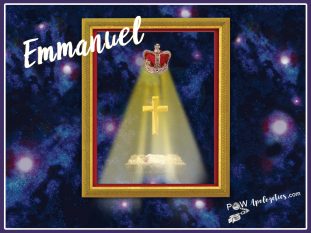THE BIRTH OF EMMANUEL, THE SECOND BIG BANG
 Christmas day commemorates the birth of Jesus Christ in Bethlehem at the start of the first century. Concerning the incarnation—a foundational doctrine of the Christian faith—C. S. Lewis wrote, “The Son of God became a man to enable men to become sons of God.”1
Christmas day commemorates the birth of Jesus Christ in Bethlehem at the start of the first century. Concerning the incarnation—a foundational doctrine of the Christian faith—C. S. Lewis wrote, “The Son of God became a man to enable men to become sons of God.”1
In the grand scheme, God foreordained all the details surrounding the earthly arrival of Jesus Christ. At just the proper moment, in the “fullness of time” (Gal. 4:4), God the Father sent forth His beloved Son to earth to redeem mankind.
Wonder of wonders! Emmanuel—literally “God with us” (Isa. 7:14)—had arrived. Humbly born as a baby. The long-awaited, long-predicted Messiah.
When Jesus stepped into time and space, He passed from the cradle … to the cross … to the crown of glory. As a result, all true believers are part of His everlasting kingdom.
Two Big Bangs—Creation and Incarnation
We read about a first “Big Bang” in Genesis 1:1, “In the beginning God created the heavens and the earth.” God spoke the universe into existence. Only infinite God could create something out of nothing. Then Luke 2:11 presents a second Big Bang. An angel of the Lord delivered this universe-rocking message for all people: “There is born to you this day in the city of David [Bethlehem] a Savior, who is Christ the Lord.”
Thus, Jesus Christ is our King. Our Savior and Lord. Love personified. Fully divine and fully human. What a profound miracle and mystery—that the second Person of the Trinity2 condescended to take on human flesh (see John 1:14; Phil. 2:6–8, 1 Tim. 3:16).
The Intense Mission of Emmanuel
As the ultimate humble servant, Jesus came to be “with us” and die on the cross. To shed His blood for the forgiveness of our sins (Eph. 1:7; Heb. 9:22). To reconcile God and man (Rom. 5:10). To rescue mankind from our fallen state so we’d never be separated from God again (2 Cor. 5:21). To adopt us as His beloved sons and daughters forever (Gal. 4:5–7).
The Birth of Emmanuel—a Prophecy and its Fulfillment
One of the best-known messianic (Christmas) prophecies in the Old Testament is found in Isaiah 7:14. It states that someday a deliverer would be born, and there would be a “sign” of his unique birth. A virgin woman would conceive by the Holy Spirit, and she would bear a Son and call Him “Emmanuel.”
In one way this prophecy was fulfilled in the time of Isaiah with a local application, yet ultimately it was fulfilled seven centuries later by the miraculous birth of Jesus.3-4 As revealed in the Matthew 1:18–25 passage, an angel of the Lord appeared in a dream to a carpenter named Joseph. Quoting Isaiah 7:14, the angel informed Joseph that Mary (his wife-to-be) was the virgin whom God had chosen to bear the Messiah. A few months later, Mary brought forth her firstborn Son, named Jesus—for He would “save His people from their sins” (v. 21).
Implications of the Incarnation for Non-Christians
Unbelievers would be wise to consider the claims of Christ, due to the serious consequences presented in the Bible regarding accepting or rejecting the Savior of the world. For example, Jesus declared, “I am the way, the truth, and the life. No one comes to the Father except through Me” (John 14:6).
They’d also be wise to investigate the evidence for spiritual truth. Surely they’d discover that the evidence for the truth of Christianity is like a mountain that towers over all religions. Here’s just one example:
The Bible—a compilation of 66 historical books, written over a period of 1,500 years, by forty different authors, in three languages, on three continents—has complete harmony and unity. That could only happen because the ultimate Author of Scripture is the Holy Spirit. He superintended all of the Scripture writing, which was done by chosen “holy men of God” (2 Peter 1:21).
It would also benefit them to consider Jesus’ immeasurable love for them. According to the Bible, the One who lived, died by crucifixion, then returned to life on the third day, wants everyone to know that He did so to purchase their salvation and spare them from eternal destruction. And He is only a heartfelt prayer away from them.
Implications of the Incarnation for Christians
Here are some of the ways believers can respond to God’s amazing grace and love: To love God as number one on our hearts, and love others. To worship Him in prayer and song. To express gratitude to Him. To serve Him as He leads. To obey Him by His grace. And to study the Bible, to grow in the grace and knowledge (gnosis) of the Lord Jesus Christ (2 Pet. 3:18).
For example, here’s one astounding incarnation Scripture that can stir us to prayer. We are actually privy to a conversation that took place before time began, between God the Father and His divine Son. It concerns Christ’s coming to earth in the form of a man to do the Father’s will. In humble submission, Christ said:
“Sacrifice and offering You did not desire, but a [human] body You have prepared for Me. In burnt offerings and sacrifices for sin You had no pleasure. Then I said, ‘Behold, I have come—in the volume of the book it is written of Me—to do Your will, O God.’” (Heb. 10:5–7 NKJV)
“Thank you, Emmanuel, for coming to be with us out of sacrificial love. You stepped down from glory and set aside some of Your divine privileges to carry out the plan of redemption. You lived a sinless life, then died in our place so we could live. You are greater than anything we could imagine. Hallelujah!”
Emmanuel, Emmanuel, His name is called Emmanuel.
He is with us, revealed in us, His name is called Emmanuel.5
________________________________________________________________________
1 C. S. Lewis. Mere Christianity (HarperSanFrancisco, 2001), 154. 2 In Christian theology, Jesus is the preexistent divine Logos and the second hypostasis (second Person) of the Trinity. He is 100% human and 100% divine. 3 This passage illustrates a (hermeneutical) principle of prophecy—that predictive prophecy can have both a “near and far fulfillment.” 4 Bible commentator David Guzik presents several reasons why we know Isaiah 7:14 miraculously speaks of Jesus Christ (https://enduringword.com/bible-commentary/isaiah-7/.) See also the commentary provided by Dwight Pentecost. 5 Bob McGee, “Emmanuel, His Name Is Called Emmanuel,” ©1976 C.A. Music (a division of Christian Artists Corp.).






